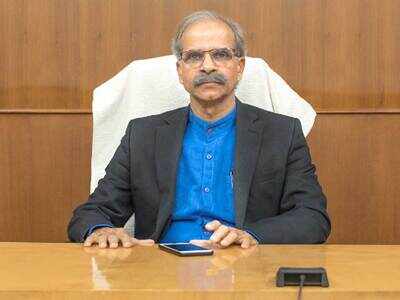- News
- Education News
- News
- Focussing on creating tech pathway from lab to land, says newly-appointed IIT Kharagpur director
Trending
This story is from January 13, 2020
Focussing on creating tech pathway from lab to land, says newly-appointed IIT Kharagpur director
Newly-appointed director Virendra Kumar Tewari on his vision for the future and the diverse approach to fulfil the institute's goals

Newly-appointed IIT Kharagpur director Virendra Kumar Tewari.
Newly-appointed director Virendra Kumar Tewari on his vision for the future and the diverse approach to fulfil the institute's goals
For Virendra Kumar Tewari, the newly-appointed director of IIT, Kharagpur, the familiarity with the institute goes back a long way. The journey started on the same campus as a campus boy completing his BTech (Hons) in Agricultural and Food Engineering followed by an MTech in Farm Machinery and Power Engineering and later PhD in Engineering.
Sharing his vision for the future, Tewari in an exclusive chat with Education Times says, "The foremost initiative would be to form an advisory committee comprising former directors of IIT Kharagpur."
Among the thrust areas, Tewari hopes to focus on institutional ranking, water consumption management, waste management, rural development projects, technology commercialisation and cultural exchange among students within the institute and beyond.
Since the institute is engaged in rural technology innovation and livelihood development, training farmers and associated workforce towards technology implementation, it is expected that his research expertise in the areas of ergonomics and industrial safety, agricultural machine design and
Talking about the 2100 acre campus, Tewari, a Jawaharlal Nehru awardee in the field of agricultural mechanisation, says, "The Kangsabati River in our neighbouring region can be a direct source of our freshwater requirement. We will be completing a project to create another direct pipeline from the river. Further to this, we are reviewing the management of solid and other forms of waste including e-waste to align with the environmental norms of government of India and Swachh Bharat Abhiyan.
Several of our faculty members who are working in these areas will be consulted to develop avenues of waste management system which will not only be at par with global methods but also suited for Indian conditions."
The director has been mulling on a strategy to deliver market-ready innovative products and processes by every academic unit. "The goal of this initiative would be to mentor student entrepreneurs and create a pathway for technologies from lab to land," Tewari adds.
He is keen to focus on the individual strength of every faculty member be it in the area of innovation and market oriented research or excelling in teaching-learning methods or industry outreach. "To strengthen our teaching and learning at the departmental level, we should take better advantage of initiatives like GIAN and Professor of Practice to boost expertise from industry and abroad. Of course, we would first have to build the required infrastructure needed to host them," says Tewari.
For Virendra Kumar Tewari, the newly-appointed director of IIT, Kharagpur, the familiarity with the institute goes back a long way. The journey started on the same campus as a campus boy completing his BTech (Hons) in Agricultural and Food Engineering followed by an MTech in Farm Machinery and Power Engineering and later PhD in Engineering.
Sharing his vision for the future, Tewari in an exclusive chat with Education Times says, "The foremost initiative would be to form an advisory committee comprising former directors of IIT Kharagpur."
Among the thrust areas, Tewari hopes to focus on institutional ranking, water consumption management, waste management, rural development projects, technology commercialisation and cultural exchange among students within the institute and beyond.
"Our goal is to compete with the top 10 universities in the world to climb the ladder of global ranking. The past directors' advisory group will engage extensively towards improving the holistic performance of the institute and help achieve this goal," says Tewari, who joined the institute as a faculty in 1990 and later became a professor of Farm Machinery and Power Engineering in 2003.
Since the institute is engaged in rural technology innovation and livelihood development, training farmers and associated workforce towards technology implementation, it is expected that his research expertise in the areas of ergonomics and industrial safety, agricultural machine design and
precision agriculture will further enhance the institute's work in these fields.
Talking about the 2100 acre campus, Tewari, a Jawaharlal Nehru awardee in the field of agricultural mechanisation, says, "The Kangsabati River in our neighbouring region can be a direct source of our freshwater requirement. We will be completing a project to create another direct pipeline from the river. Further to this, we are reviewing the management of solid and other forms of waste including e-waste to align with the environmental norms of government of India and Swachh Bharat Abhiyan.
Several of our faculty members who are working in these areas will be consulted to develop avenues of waste management system which will not only be at par with global methods but also suited for Indian conditions."
The director has been mulling on a strategy to deliver market-ready innovative products and processes by every academic unit. "The goal of this initiative would be to mentor student entrepreneurs and create a pathway for technologies from lab to land," Tewari adds.
He is keen to focus on the individual strength of every faculty member be it in the area of innovation and market oriented research or excelling in teaching-learning methods or industry outreach. "To strengthen our teaching and learning at the departmental level, we should take better advantage of initiatives like GIAN and Professor of Practice to boost expertise from industry and abroad. Of course, we would first have to build the required infrastructure needed to host them," says Tewari.
End of Article
FOLLOW US ON SOCIAL MEDIA










